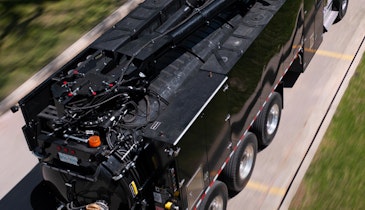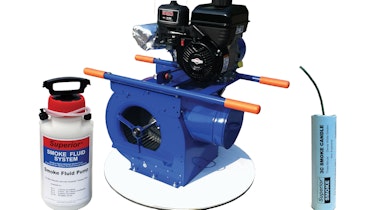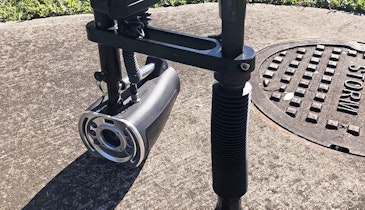Interested in Infrastructure?
Get Infrastructure articles, news and videos right in your inbox! Sign up now.
Infrastructure + Get AlertsNASSCO’s Government Relations Committee goes the extra mile in helping the association achieve its goal to advocate for the underground infrastructure industry. Led by Committee Chair Steve Dye of Nexus Government Relations, and co-chaired by Chris White of Redzone Robotics, NASSCO is fortunate to have industry experts who provide trusted information to share with its members on the topic of funding.
One topic of particular interest to NASSCO members is the Build America, Buy America mandate. When Congress passed the Infrastructure Investment & Jobs Act in 2021, included was a provision that all federally funded or financed infrastructure projects are required to use Made in America materials, such as iron and steel, manufactured products and construction materials, bringing about the BABA mandate.
For water infrastructure projects, the BABA mandate presents a host of challenges due to limited domestic production of materials and products critical for managing drinking water and wastewater. To be clear, the mandate only applies to materials and products that remain permanently on-site of a project funded or financed with federal money; equipment or materials that are removed following construction do not need to meet the BABA mandate.
Over the last several years the White House Made in America Office and the U.S. Environmental Protection Agency have released guidance on what is required of federal funding recipients and technology providers to either be in compliance with the BABA mandate or obtain a waiver from the mandate if certain criteria are met.
On August 14, 2023, the MIAO published much awaited final guidance that clarifies what is required of product manufacturers to meet the Made in America threshold for iron and steel products, manufactured products and construction materials. For construction materials, certain kinds of material that were excluded from the BABA mandate because they were exempted in the IIJA statutory language, included “cement and cementitious materials; aggregates such as stone, sand or gravel; or aggregate binding agents or additives.”
The IIJA statutory language required that the end-product must be manufactured in the United States and more than 55% of the total cost of all components of the manufactured product must also be of U.S. origin. The question the recent MIAO guidance attempts to answer is what “costs” can be counted towards the 55% threshold. The guidance stated:
- When a product manufacturer manufactures their own components, all costs associated with the manufacturing of the component, including transportation costs, plus allocable overhead costs are included. The guidance does not allow for the cost of manufacturing the end-product but allows for the costs of manufacturing the components that go into the end-product.
- When a product manufacturer purchases components, they can calculate the following costs toward the 55% threshold: the acquisition cost, including transportation costs to the place of incorporation into the manufactured product, regardless of whether or not such costs are paid to a domestic firm, and any applicable duty, regardless of whether or not a duty-free entry certificate is issued.
The recent MIAO guidance also addresses the question of how to define iron and steel products, construction materials, and manufactured products. The guidance states:
- Iron or steel products means “articles, materials, or supplies that consist wholly or predominantly of iron or steel or a combination of both.”
- Construction Materials means “articles, materials, or supplies that consist of only one of the following: nonferrous metals; plastic and polymer-based products (including polyvinylchloride, composite building materials, and polymers used in fiber optic cables); glass (including optic glass); fiber optic cable (including drop cable); optical fiber; lumber; engineered wood; and drywall.” The definition also notes that “minor additions of articles, materials, supplies or binding agents to a construction material do not change the categorization of the construction material.”
- Manufactured Products means “articles, materials, or supplies that have been processed into a specific form and shape; or combined with other articles, materials, or supplies to create a product with different properties than the individual articles, materials or supplies.”
Finally, the MIAO guidance looked to clarify the criteria for funding recipients to obtain a waiver if they are unable to acquire materials or products that meet the BABA thresholds. Waivers will be granted for the following reasons:
- Public interest waiver — Applying the Buy America Preference would be inconsistent with the public interest.
- Nonavailability waiver —Types of iron, steel, manufactured products or construction materials are not produced in the United States in sufficient and reasonably available quantities or of a satisfactory quality.
- Unreasonable cost waiver —The inclusion of iron, steel, manufactured products or construction materials produced in the United States will increase the cost of the overall infrastructure project by more than 25%.
Additionally, previous guidance for the following waivers remains in effect:
- Small Projects Waiver – Federally funded projects of less than $250,000.
- De Minimus Waiver – Products that qualify for a de minimis waiver cumulatively may comprise no more than a total of 5% of the total project cost.
For additional information, links to the guidance and resources by White House Made in America Office U.S. EPA, and links of the state SRF authorities, please visit nassco.org/advocacy/government-relations.





